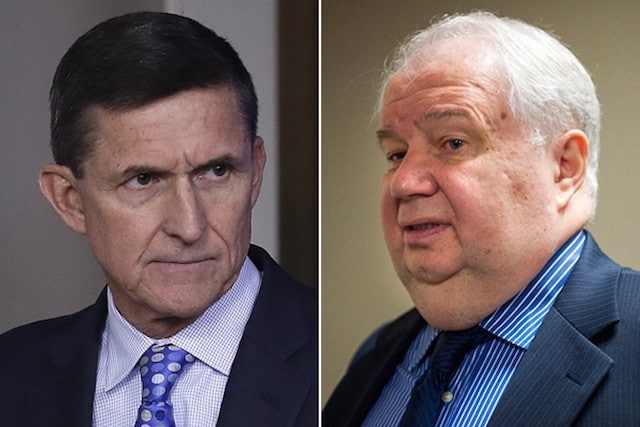Michael Flynn, former head of the Defense Intelligence Agency, and Russian Ambassador Sergey Kislyak
Before the 2016 Presidential election, Michael Flynn — senior Trump campaign official and later National Security Advisor — discussed sanctions removal with Russian Ambassador Sergei Kislyak, according to Flynn’s associates.
If supported, the claim would heighten pressure on Donald Trump over allegations of conspiracy between his campaign and Moscow.
Flynn has pleaded guilty to lying to the FBI over his contacts with Kislyak. But attention to date has focused on five calls between the two men in December 2016, after Trump defeated Hillary Clinton. Flynn is awaiting sentencing over his lies about the discussions.
The pre-November contacts had been revealed as early as February 2017, as Flynn left his National Security Advisor’s post after only 24 days; however, no details had been given.
Now two Flynn associates have told Mother Jones magazine of the former general’s comments that he spoke with Kislyak before Election Day about how Trump could work productively with Russia.
One said a grand bargain was discussed, in which the US would ease or end sanctions on Russia over its annexation of Crimea and military intervention in Ukraine. In return, Moscow would cooperate with the Trump Administration to resolve the Syrian conflict.
The other source said Flynn and Kislyak spoke about Syria, Iran, and other foreign policy matters that Russia and the US could tackle together if Trump won.
A third Flynn associate said just after the election, Flynn spoke of contact with Kislyak about Syria but without saying whether that was before or after the vote.
Throughout the 2016 campaign, Trump and his campaign insisted there was no Russian responsibility for hacks of computer servers of the Democratic National Committee and nominee Hillary Clinton’s staff. They did so even after Trump and Flynn received a secret intelligence briefing in mid-August 2016, with the preliminary conclusion that Moscow was orchestrating the dissemination of anti-Clinton material.
The Trump-Russia investigation of Special Counsel Robert Mueller is now reviewing possible links between Trump campaign advisor Roger Stone and his friend Jerome Corsi, WikiLeaks founder Julian Assange, and Russia to circulate the stolen e-mails in the summer and autumn. As early as April, a Russian-linked academic offered the material to Trump campaign staffer George Papadopoulos, and the offer was the topic of a meeting in early June between three Kremlin-linked envoys and top Trump advisors — son Donald Trump Jr., son-in-law Jared Kushner, and campaign manager Paul Manafort.
Another Trump senior advisor, Senator Jeff Sessions, met Kislyak at least twice before the election, including in September in his Senate office.
Flynn’s contact with Kislyak began in December 2015, after the former general was invited to Moscow and paid $45,000 to attend a 10th anniversary ceremony for Russian State broadcaster RT. Flynn visited the ambassador’s home in what his son described as a “very productive” chat in an e-mail to the Russian Embassy.
At the dinner, Flynn sat at a table with Russian President Vladimir Putin.


Fake news.
We know the FBI was wiretapping Flynns phone at the time. To date, the only charges Flynn has faced are for lying, If this story were true, or if Flynn had violated the Logan Act, he would have been charged with a great deal more.